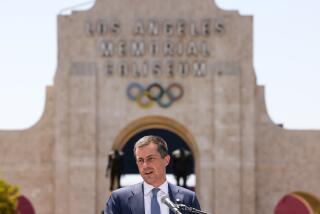Russia Is to Build More Vehicles to Ferry Space Station Crews
- Share via
MOSCOW — Fearing that the international space station might have to be left in orbit without a crew, the Russian government on Thursday accelerated funding to build space vehicles.
Yuri Koptev, director of the Russian Aviation and Space Agency, told reporters that the Russian Cabinet has approved the early release of $38 million, budgeted for the second half of the year. The government also tentatively promised to boost the agency’s budget to $240 million next year from $130 million this year, he said.
With the breakup of the space shuttle Columbia having grounded the U.S. shuttle fleet, Russia’s Progress cargo craft and three-person Soyuz spaceships are the only vehicles available to carry supplies or ferry crews. The space station is a joint project of the U.S., Russia, Japan, Canada and the European Space Agency.
U.S. astronaut Edward Lu and Russian cosmonaut Yuri Malenchenko are scheduled to ride a Soyuz to the station on April 26 for a six-month mission. The present three-member crew, Americans Kenneth Bowersox and Donald Pettit and Russian Nikolai Budarin, are to return to Earth in early May in another Soyuz capsule currently docked there as an emergency escape craft.
Russian space officials have said they do not have enough of the single-use Progress and Soyuz vehicles to meet the station’s needs if the U.S. shuttles remain grounded for an extended period. The Russian side has been pressing hard for U.S. funding to help build more of the transport craft.
Such foreign assistance will still be needed, Koptev said. But the commitment to speed up domestic funding reflects Moscow’s strong wish to avoid mothballing the station.
“The main burden now falls on us. We need to ensure additional launches and flights to the station. And this requires additional funds,” Prime Minister Mikhail M. Kasyanov said at the start of the meeting. “We can’t postpone this decision. Space exploration has always been a priority ... both during Soviet times and now.”
Koptev also announced Thursday that Russia and China soon will intensify their cooperation in space. “We may come to formalizing understandings on manned spaceflights by May,” he said. China, which is not a partner in the international space station, has announced plans to launch its first manned mission later this year.
Koptev stressed that it would be unwise to leave the space station even temporarily crewless. “We have had a number of cases already when computers that run all systems onboard the station would freeze up, and it was not always possible to fix everything from the Earth,” he said. “The station has not become ‘broken-in’ quite yet.”
Technicians could possibly lose control of an empty station, which could then drift out of its orbit and eventually plunge to Earth, he warned. It must remain occupied “so that it does not become a piece of wreckage,” he said.
NASA officials have said that the U.S. agency cannot now pay for construction of any extra Russian space vehicles because of the Iran Nonproliferation Act of 2000. That law restricts payments to Russia made in connection with the space station unless the United States confirms that Russia has not transferred banned missile technology or technology for nuclear, biological or chemical weapons to Iran in the previous 12 months. An exception is allowed for crew safety.
U.S. complaints about Russian support for Iran’s efforts to develop nuclear power, combined with general U.S.-Russian tension over the Iraq war, have meant that at least so far, the law has been a firm barrier to any possible American funding.
Talks with the U.S. side on extra funding “are continuing, but not easily,” Koptev said. He added that without “substantial participation by Western partners” to fund more spacecraft, “the station will have to be temporarily closed down.”
He noted that tensions over Iraq make it more difficult to find a solution, but he said “it is impermissible to hold the international space station hostage to the political situation.”
The Cabinet’s decision to speed construction of space vehicles means that other aspects of the Russian space program will need to be sacrificed, Koptev said. Russia is no longer building new modules to expand the station and has stopped developing scientific equipment for use there, he said.
Yet Russia has a “moral obligation” to carry on such activities “to remain a dignified partner in this project,” he said.
More to Read
Sign up for Essential California
The most important California stories and recommendations in your inbox every morning.
You may occasionally receive promotional content from the Los Angeles Times.













